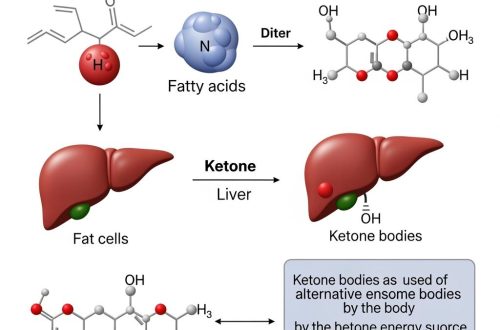How the Ketogenic Diet May Transform Your Mental Health and Cognitive Performance
The human brain is an energy-hungry organ, consuming roughly 20% of our daily calories despite representing only 2% of our body weight. For decades, we’ve understood that glucose serves as the brain’s primary fuel source, but emerging research reveals a fascinating alternative: ketones. As the ketogenic diet gains mainstream attention for weight loss and metabolic health, scientists and practitioners are uncovering compelling evidence that this high-fat, low-carbohydrate approach may offer profound benefits for mental health and cognitive function.
The relationship between diet and brain health isn’t new, but our understanding of how nutritional ketosis affects neural function represents a paradigm shift in how we think about feeding our minds. From enhanced focus and mental clarity to potential therapeutic applications for depression and anxiety, the ketogenic diet is challenging conventional wisdom about optimal brain nutrition.
Understanding the Ketogenic Brain
When carbohydrate intake drops to very low levels, typically below 20-50 grams per day, the liver begins producing ketones from stored and dietary fat. These ketones cross the blood-brain barrier and provide an alternative energy source for brain cells. Unlike glucose, which requires insulin for cellular uptake, ketones can be utilized directly by neurons, offering a more stable and efficient fuel source.
This metabolic switch triggers a cascade of neurological changes. Ketones appear to enhance mitochondrial function in brain cells, potentially improving cellular energy production and reducing oxidative stress. The brain’s ability to use ketones efficiently may explain why many people report feeling mentally sharper and more focused when following a ketogenic diet.
Research suggests that ketones provide approximately 70% more energy per unit of oxygen consumed compared to glucose. This efficiency may translate into improved cognitive performance, particularly during periods of mental stress or when glucose availability is limited. The brain’s enhanced energy state under ketosis could be one reason why practitioners often experience what’s commonly called “keto clarity” or improved mental focus.
Mental Health Benefits: Beyond the Basics
The connection between ketosis and mental health extends far beyond simple energy provision. Several mechanisms appear to contribute to improved mood and emotional well-being on a ketogenic diet. One of the most significant involves the regulation of neurotransmitters, the chemical messengers that facilitate communication between brain cells.
Ketosis appears to influence gamma-aminobutyric acid (GABA), the brain’s primary inhibitory neurotransmitter. GABA helps calm neural activity and reduce anxiety, and some research suggests that ketones may enhance GABAergic function. This could explain why many people report feeling less anxious and more emotionally stable when following a ketogenic diet.
The diet’s impact on inflammation also plays a crucial role in mental health benefits. Chronic inflammation has been linked to depression, anxiety, and cognitive decline. The ketogenic diet appears to reduce systemic inflammation through multiple pathways, including decreased production of inflammatory cytokines and improved antioxidant status. This anti-inflammatory effect may contribute to improved mood and reduced symptoms of depression.
Blood sugar stability represents another critical factor in mental health. The standard high-carbohydrate diet often leads to significant glucose fluctuations throughout the day, which can contribute to mood swings, irritability, and anxiety. By maintaining steady ketone levels, the ketogenic diet provides a more consistent energy supply to the brain, potentially reducing these emotional roller coasters.
Emerging research also suggests that ketosis may influence the production of brain-derived neurotrophic factor (BDNF), a protein that supports the growth and survival of neurons. Higher BDNF levels are associated with improved mood, better stress resilience, and enhanced cognitive function. Some studies indicate that ketogenic diets may increase BDNF production, though more research is needed to fully understand this relationship.
Cognitive Enhancement and Mental Clarity
Perhaps the most immediately noticeable benefit reported by ketogenic diet followers is enhanced mental clarity and cognitive performance. This improvement appears to manifest in several ways, from better focus and concentration to improved memory and processing speed.
The brain’s enhanced energy efficiency under ketosis may contribute to improved attention and reduced mental fatigue. Many people report being able to concentrate for longer periods without experiencing the typical afternoon energy crashes associated with glucose-dependent metabolism. This sustained mental energy can lead to improved productivity and better cognitive performance throughout the day.
Memory function also appears to benefit from ketosis. Some research suggests that ketones may enhance memory consolidation and recall, particularly in older adults or those with mild cognitive impairment. The neuroprotective effects of ketones may help preserve cognitive function and potentially slow age-related mental decline.
Executive function, which includes skills like decision-making, problem-solving, and impulse control, may also improve under ketosis. The stable energy supply provided by ketones, combined with reduced inflammation and improved neurotransmitter function, creates an optimal environment for higher-order cognitive processes.

Therapeutic Applications in Mental Health
Beyond general cognitive enhancement, researchers are investigating the ketogenic diet’s potential as a therapeutic intervention for various mental health conditions. While much of this research is still in early stages, the results are promising and suggest that nutritional ketosis may offer new treatment avenues for psychiatric disorders.
Depression research has shown particularly encouraging results. Several small studies and case reports suggest that ketogenic diets may help reduce depressive symptoms, sometimes within weeks of starting the diet. The mechanisms likely involve improved brain energy metabolism, reduced inflammation, and enhanced neurotransmitter function. Some researchers theorize that depression may, in part, represent a metabolic disorder of the brain, making the ketogenic diet’s metabolic benefits particularly relevant.
Anxiety disorders may also respond favorably to ketogenic interventions. The diet’s stabilizing effects on blood sugar, combined with its influence on GABA function, may help reduce anxiety symptoms. Many practitioners report feeling calmer and more emotionally stable when following a ketogenic diet, though individual responses can vary significantly.
Bipolar disorder represents another area of active investigation. Some preliminary research suggests that ketogenic diets may help stabilize mood in people with bipolar disorder, potentially reducing both manic and depressive episodes. The mood-stabilizing effects may relate to the diet’s impact on brain energy metabolism and neurotransmitter function.
Attention deficit hyperactivity disorder (ADHD) has also garnered research attention. Some small studies suggest that ketogenic diets may help improve focus and reduce hyperactivity in children and adults with ADHD. The mechanism likely involves improved dopamine function and enhanced prefrontal cortex activity, though more research is needed to establish clear therapeutic protocols.
Neurological Protection and Long-term Brain Health
The ketogenic diet’s neuroprotective properties extend beyond immediate cognitive benefits to potential long-term brain health advantages. Ketones appear to protect neurons from various forms of damage and may help preserve cognitive function as we age.
Oxidative stress, which contributes to cellular aging and neurodegeneration, appears to be reduced under ketosis. Ketones serve as efficient fuel sources that produce fewer reactive oxygen species compared to glucose metabolism. This reduced oxidative burden may help protect brain cells from damage and support healthy aging.
The diet’s anti-inflammatory effects also contribute to neuroprotection. Chronic brain inflammation has been implicated in various neurodegenerative conditions, including Alzheimer’s disease and Parkinson’s disease. By reducing inflammatory markers, ketogenic diets may help protect against these conditions and preserve cognitive function over time.
Emerging research suggests that ketones may also promote the growth of new brain cells and enhance neural plasticity. This neuroplasticity enhancement could support learning, memory formation, and recovery from brain injuries.
Practical Considerations and Individual Variation
While the potential mental health and cognitive benefits of ketogenic diets are compelling, it’s important to recognize that individual responses can vary significantly. Some people experience rapid improvements in mental clarity and mood, while others may take weeks or months to notice benefits. A small percentage of individuals may not respond favorably at all.
The transition period, often called the “keto flu,” can temporarily affect cognitive function and mood as the body adapts to using ketones for fuel. During this adaptation phase, some people experience brain fog, irritability, or fatigue. These symptoms typically resolve within a few days to a few weeks as ketosis establishes itself.
Electrolyte balance plays a crucial role in both the transition period and ongoing cognitive benefits. The ketogenic diet’s diuretic effect can lead to losses of sodium, potassium, and magnesium, which are essential for proper brain function. Maintaining adequate electrolyte levels through diet and supplementation can help optimize cognitive performance and minimize side effects.
Individual factors such as genetics, gut microbiome composition, and existing health conditions can all influence how someone responds to a ketogenic diet. Some people may benefit from modified approaches, such as cyclical ketosis or targeted ketogenic diets that allow for strategic carbohydrate timing around workouts or specific activities.
The Future of Ketogenic Mental Health Research
As interest in the ketogenic diet’s mental health applications continues to grow, researchers are conducting larger, more rigorous studies to better understand optimal protocols and identify who might benefit most from this approach. Future research will likely focus on personalized ketogenic interventions based on individual metabolic profiles and genetic factors.
The integration of ketogenic approaches with traditional mental health treatments also represents an exciting frontier. Rather than replacing conventional therapies, ketogenic diets may serve as complementary interventions that enhance the effectiveness of existing treatments while potentially reducing side effects.
The ketogenic diet’s impact on mental health and cognitive function represents a fascinating intersection of nutrition, metabolism, and neuroscience. While more research is needed to fully understand optimal applications and long-term effects, the existing evidence suggests that nutritional ketosis may offer powerful tools for enhancing brain health, improving cognitive performance, and supporting mental well-being. As our understanding of the brain-diet connection continues to evolve, the ketogenic approach may become an increasingly important component of comprehensive mental health strategies.





